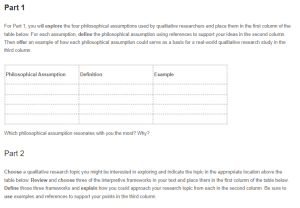Philosophical Assumptions and Frameworks in Qualitative Research – Exploring Mental Healthcare Access
Part 1
For Part 1, you will explore the four philosophical assumptions used by qualitative researchers and place them in the first column of the table below. For each assumption, define the philosophical assumption using references to support your ideas in the second column. Then offer an example of how each philosophical assumption could serve as a basis for a real-world qualitative research study in the third column.
| Philosophical Assumption | Definition | Example |
| Ontology | Relates to the nature of reality. It is based on the understanding that qualitative researchers embrace multiple realities (Matta, 2021). | The researcher reports different realities or perspectives as themes adopted from the research findings (Matta, 2021). |
| Axiology | Relates to the values and roles of researchers in qualitative research (Bleiker et al., 2019) | The researcher integrates their values and those of the research participants when reporting (Bleiker et al., 2019) |
| Methodology | Defines the process of the research. It is shaped by the researcher’s experience in data collection and analysis (Bleiker et al., 2019). | Researchers work with individuals before making conclusions or generalizations. They also revise the research questions constantly based on their experiences and findings in the field (Bleiker et al., 2019). |
| Epistemology | This relates to how close to the study participants qualitative researchers get when conducting qualitative studies. Knowledge is obtained from subjective experiences, as reported by the participants (Matta, 2021). | The researcher spends time doing fieldwork and interacting with the participants to obtain their views and experiences, which the researcher quotes as evidence (Matta, 2021). |
Which philosophical assumption resonates with you the most? Why?
The philosophical assumption that resonates with me the most is epistemology. This assumption captures the need for contact between the researcher and the participants when conducting qualitative studies. Close contact allows the researcher to better understand the lived experiences of the study participants and obtain their perspective on aspects of the study (Bleiker et al., 2019)
Part 2
Choose a qualitative research topic you might be interested in exploring and indicate the topic in the appropriate location above the table below. Review and choose three of the interpretive frameworks in your text and place them in the first column of the table below. Define those three frameworks and explain how you could approach your research topic from each in the second column. Be sure to use examples and references to support your points in the third column.
Qualitative Research Topic: Exploring the enablers of poor access to mental healthcare among ethnic minority groups.
| Interpretive Framework | Definition/Explanation of the Interpretive Framework | Example of How Your Research Topic (Listed Above) Would Be Explored Using This Framework |
| Transformative framework | Based on the precinct, knowledge aims to help people improve their communities (Ramanadhan et al., 2021). | Findings from the research will help improve mental healthcare (Ramanadhan et al., 2021). |
| Social constructivism | Asserts that knowledge is socially constructed through human interactions and shared discourses about a phenomenon (Ramanadhan et al., 2021). | The research will seek to understand the enablers of poor access to mental healthcare within a community (Ramanadhan et al., 2021). |
| Postmodernism | Knowledge claims should be based on multiple perspectives of class and other group affiliations (Ramanadhan et al., 2021). | The study explores factors influencing healthcare access among ethnic minority groups (Ramanadhan et al., 2021). |
References
Bleiker, J., Morgan-Trimmer, S., Knapp, K., & Hopkins, S. (2019). Navigating the maze: Qualitative research methodologies and their philosophical foundations. Radiography, 25. https://doi.org/10.1016/j.radi.2019.06.008
Matta, C. (2021). Philosophical paradigms in qualitative research methods education: What is their pedagogical role? Scandinavian Journal of Educational Research, 66(6), 1049–1062. https://doi.org/10.1080/00313831.2021.1958372
Ramanadhan, S., Revette, A. C., Lee, R. M., & Aveling, E. L. (2021). Pragmatic approaches to analyzing qualitative data for implementation science: An introduction. Implementation Science Communications, 2(1). https://doi.org/10.1186/s43058-021-00174-1
ORDER A PLAGIARISM-FREE PAPER HERE
We’ll write everything from scratch
Question
Part 1
For Part 1, you will explore the four philosophical assumptions used by qualitative researchers and place them in the first column of the table below. For each assumption, define the philosophical assumption using references to support your ideas in the second column. Then offer an example of how each philosophical assumption could serve as a basis for a real-world qualitative research study in the third column.
| Philosophical Assumption | Definition | Example |
Which philosophical assumption resonates with you the most? Why?

Philosophical Assumptions and Frameworks in Qualitative Research
Part 2
Choose a qualitative research topic you might be interested in exploring and indicate the topic in the appropriate location above the table below. Review and choose three of the interpretive frameworks in your text and place them in the first column of the table below. Define those three frameworks and explain how you could approach your research topic from each in the second column. Be sure to use examples and references to support your points in the third column.
Qualitative Research Topic: <Insert qualitative research topic here.>
| Interpretive Framework | Definition/Explanation of the Interpretive Framework | Example of How Your Research Topic (Listed Above) Would Be Explored Using This Framework |
References
<Cite references for Parts 1 and 2 according to APA format here.>

